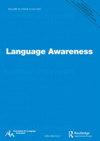初学和有经验的二语教师在高等教育在线教学环境中的教学认知变化及其相关前因
IF 2.2
2区 文学
0 LANGUAGE & LINGUISTICS
引用次数: 2
摘要
摘要关于教师认知的一些研究仍然以认知为主,忽视了教师思想的社会中介性质。其中一个环节是对教师教学知识库的研究,该知识库被定义为教师教学表现的基本思想单元/类别。为了解决这一差距,本研究调查了二语教师的教学知识库,特别关注高等教育水平的在线阅读教学,以及这种教学思想的前因。为此,招募了三名新手和三名经验丰富的教师作为参与者。每位教师的一次完整的在线教学会议被录制成视频,并被用作检查他们的教学思想单元(PTU)和驱动/塑造思想的前因的刺激。研究结果显示,两组学生的教学思想类别存在显著差异。研究结果进一步表明,经验丰富的教师的教学知识是由认知和社会来源提供的,而新手教师的思想更倾向于认知。特别是,经验丰富的教师强调了以往的教学经验、学生的反馈和同事的建议,作为指导他们PTU的中介。相比之下,新手教师依靠研究性理论和教师教育课程中的知识来传达他们的教学思想。本文章由计算机程序翻译,如有差异,请以英文原文为准。
Variations in novice and experienced L2 teachers’ pedagogical cognitions and the associated antecedents in tertiary-level online instructional contexts
Abstract Some strands of research on teacher cognition have remained predominantly cognitive and overlooked the socially-mediated nature of teachers’ thoughts. One such strand is the research on teachers’ pedagogical knowledge base, defined as the thought units/categories underlying teachers’ instructional performance. To address this gap, the present study investigated L2 teachers’ pedagogical knowledge base with a specific focus on online reading instruction at a tertiary education level and the antecedents of such pedagogical thoughts. To this end, three novice and three experienced teachers were recruited as participants. A complete online instructional session per teacher was video-recorded and used as a stimulus for inspecting their pedagogical thought units (PTUs) and the antecedents driving/shaping the thoughts. The findings revealed striking differences in the pedagogical thought categories (PTCs) of the two groups. The results further demonstrated that experienced teachers’ pedagogical knowledge was informed by both cognitive and social sources, whereas novice teachers’ thoughts were more cognitively oriented. In particular, experienced teachers highlighted prior teaching experiences, students’ feedback, and colleagues’ advice as the mediators guiding their PTUs. In contrast, novice teachers relied on knowledge from research-based theories and teacher education courses to inform their pedagogical thoughts.
求助全文
通过发布文献求助,成功后即可免费获取论文全文。
去求助
来源期刊

Language Awareness
Multiple-
CiteScore
3.70
自引率
10.00%
发文量
18
期刊介绍:
Language Awareness encourages and disseminates work which explores the following: the role of explicit knowledge about language in the process of language learning; the role that such explicit knowledge about language plays in language teaching and how such knowledge can best be mediated by teachers; the role of explicit knowledge about language in language use: e.g. sensitivity to bias in language, manipulative aspects of language, literary use of language. It is also a goal of Language Awareness to encourage the establishment of bridges between the language sciences and other disciplines within or outside educational contexts.
 求助内容:
求助内容: 应助结果提醒方式:
应助结果提醒方式:


